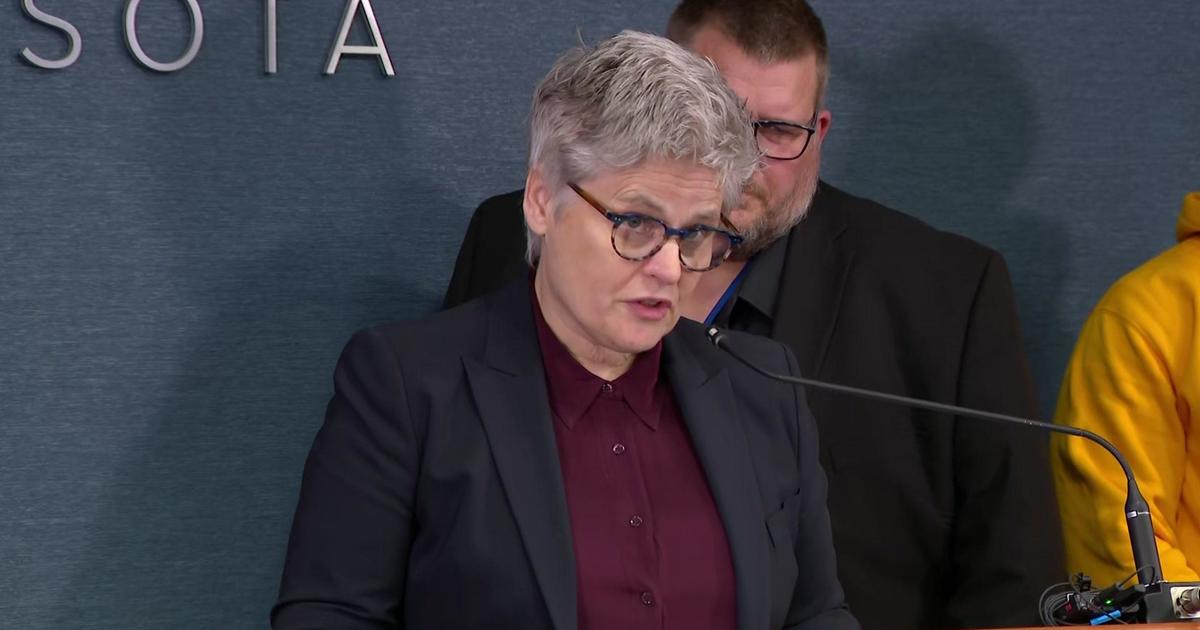Gov. Walz Directs State Law Enforcement Agencies To Release Body Cam Footage In Deadly Police Encounters Within 5 Days
MINNEAPOLIS (WCCO) -- Gov. Tim Walz on Monday took executive action on some police reform measures as DFL lawmakers and community advocates criticize a public safety deal they say is devoid of real accountability for law enforcement.
Walz said he would flag $15 million in federal pandemic relief funds for community violence intervention programs and order a review of the Peace Officers Standards and Training Board's data processes and require it publish a public data dashboard.
His plan also requires state law enforcement agencies like the Minnesota State Patrol to release body camera video to families no later than five days after one of their loved ones is killed by law enforcement.
"Those are the things people are asking for. They build trust," he said. "They build trust in our police. They build trust in our systems. They build trust amongst communities and they provided what's needed in some cases—closure."
The governor's announcement comes as the special session's deadline before a partial government shutdown Thursday looms and as criticism surrounding the public safety budget agreement intensifies.
"We need these human beings to be held accountable for their actions if they hurt another human being no matter their title or the uniform that they wear," said Toshira Garraway, founder of Families Supporting Families Against Police Violence during a Monday morning news conference at the state capitol.
She and other advocates demanded more of the state legislature as it works to pass its bill funding public safety, the courts and corrections system. They say the deal, struck by legislative leaders over the weekend, is inadequate in addressing the needs of communities of color.
"Today is a shameful day for the state of Minnesota that the state that killed George Floyd is yet unable to pass police accountability," said Jaylani Hussein, executive director of CAIR-MN. "That failure is not an option."
The agreement includes funding for more police body cameras, limits on no-knock warrants and changes to the Peace Officers Standards and Training Board's database to create an early warning system to track patterns of police misconduct. It also toughens penalties for individuals who assault police officers, a Republican priority, among other provisions in the 200-page bill.
Senate Majority Leader Paul Gazelka, R-East Gull Lake, noted that Senate Republicans had to give up some of their priorities, too, as part of a compromise to get a deal passed in a divided legislature. He renewed his promise to not sign off any proposals he perceives as "anti-police" and said he believes the agreement accomplishes that.
"The Democrats of the House wanted to go in one direction, we wanted to go the other," Gazelka said of the negotiations. "Senate Republicans believe that we need to stand up for our police officers as they stand in the gap for us day in and day out."
DFL lawmakers in the People of Color and Indigenous Caucus also on Monday criticized the bill for not including language that would limit traffic stops for certain minor violations in an effort to curb pretextual stops and would allow "sign and release" warrants for low-level offenses.
The agreement also did not include a proposal guaranteeing families of people killed by law enforcement to witness body camera video of the incident within 48 hours. The governor's executive action doesn't cover all law enforcement agencies—only those that fall under state government—and allows some more time before video is required to be released.
"We simply don't want bad policing" said. Rep. Samantha Vang, DFL-Brooklyn Center. "At a time when we have a global community asking for better policing, Senate Republicans are at a standstill."
On Monday, they vowed to add all of those provisions back into the bill as amendments during floor debate on Tuesday. They also said they would add an amendment increasing the statute of limitations for filing wrongful death lawsuits from three years to six years.
But Gazelka said Republicans would move to strip those provisions out of the bill once it reaches his chamber as leaders try to keep all over government services operating and avoid what they have promised to keep at bay: a partial shutdown.
"In the end you have to say look it's over. We've got to wrap this up," he said. "We are all conscious of the fact that whatever we don't get done by July 1, there's no funding—that part will shut down."
Walz echoed Gazelka, calling the consequences of not passing a spending plan "pretty drastic" and stressing that everything needs to be buttoned up by Wednesday or a "whole spectrum" of government services are at stake.
CAIR-MN and other advocates asked Walz to veto the bill in its current form; Walz said he wouldn't. He asked his DFL colleagues in the legislature to support the agreement, even without the changes they want to see in it.
"I would encourage them to support the legislation," Walz said. "It's a compromise that we worked through together with the clear recognition that it's not enough for them."
As of Monday, five areas of the budget are signed into law with three more bills on the governor's desk for signature. The legislature needs to finish its work by midnight on Wednesday before the new fiscal year begins Thursday.



